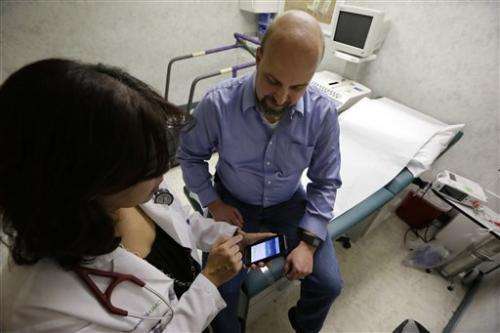Challenges for doctors using fitness trackers and apps

More hospitals and doctors are starting to use data from fitness trackers and health apps to help treat patients. But they are moving cautiously. The technology has a lot of potential, but there are key challenges to work out:
___
LIABILITY
What if a patient's data shows signs of an ailment, but no one notices? That's the chief reason Hackensack University Medical Center in New Jersey is starting with only six patients and three doctors and is monitoring mainly lifestyle data, such as nutrition. It wants to add blood pressure, heart rate and other vital signs to its monitoring, but a hospital committee needs to sign off first.
Doctors say that many patients already bring health data to visits, often as printouts that an office must then scan in. Getting data electronically through Apple's HealthKit and similar technologies would give doctors and nurses more options to see charts and look for patterns. Ultimately, Hackensack and other hospitals envision setting up a specific person or team to review incoming data. Software alerts could be triggered when a measure falls outside the ideal range, and a nurse or technician would check for accuracy and refer unusual cases to doctors.
___
IS DATA RELIABLE?
Many consumer devices such as fitness trackers aren't regulated by the Food and Drug Administration, so how much should doctors rely on them? The Center for Digital Health Innovation at the University of California, San Francisco is studying this in a partnership with Samsung. One way to test involves strapping a device on 100 individuals and measuring them as they stand, sit, exercise and sleep. Readings would be compared with those from devices known to be reliable.
"Just because it works in a lab on a couple of individuals doesn't necessarily means it works on a broad variety of individuals in real life," said Michael Blum, the center's director.
___
PRIVACY & SECURITY CONCERNS
Data entered into a health care provider's electronics record system is covered by strict federal privacy laws, which subject providers to penalties for breaches. But if you've signed waivers as part of insurance claims, your insurer can get the data, too. Nicolas P. Terry, director of the Hall Center for Law and Health at Indiana University, isn't too concerned about that, though. He said President Barack Obama's health care law includes protections for pre-existing health conditions.
Health privacy laws don't extend to technology companies that make trackers and apps, however. The companies might be subject to penalties if they fail to abide by their own privacy policies. But if they never promise to safeguard the information, they are free to share and sell it, Terry said.
The concerns exist regardless of whether a doctor is using the information for patient care. Although a step counter might seem innocuous, it also might record the location of your step.
"Now you have a surveillance system," Terry said. "If the people you meet also have wearable devices, we could figure out who you meet." He says data companies might also build health scores that potential employers and life insurance companies would love to have.
Discover the latest in science, tech, and space with over 100,000 subscribers who rely on Phys.org for daily insights. Sign up for our free newsletter and get updates on breakthroughs, innovations, and research that matter—daily or weekly.
___
DO I GET PAID FOR THIS TIME?
Historically, doctors are paid for office visits and procedures. Medicare and private insurers are starting to reward doctors for preventative care, however. With the Medicare program, for instance, doctors are given a set monthly fee to keep patients healthy. That could involve reviewing fitness data and checking on patients regularly by phone to identify problems that might otherwise necessitate more costly treatments or visits.
"It is slowly changing...but it's still challenging to get paid for analysis and for email and phone call time," said Dr. John Schumann, a Tulsa, Oklahoma, internist who blogs on health issues at GlassHospital.
___
OTHER LIMITATIONS
These devices and apps do little to ensure that patients take the medicines they're supposed to. There are companies developing sensors to record when you pick up a bottle, but for now, doctors have to trust their patients.
Doctors also need to ensure that they are not just getting data from younger patients who are already highly motivated and aware about their health.
"What we need is data for older people, and they are not doing that right now, with rare, rare exceptions," said Dr. David J. Cook, who is leading research at the Mayo Clinic into how trackers and apps can improve care. Because hip-replacement patients that Mayo wants to track tend to be older, Mayo has had to loan them Fitbit trackers and $60 Android phones.
Neither Fitbit nor Android works with Apple's HealthKit, so programmers at Mayo had to write code to integrate those devices. HealthKit should make future integration easier at Mayo and elsewhere, but there will always be some devices and apps excluded.
© 2015 The Associated Press. All rights reserved.



















